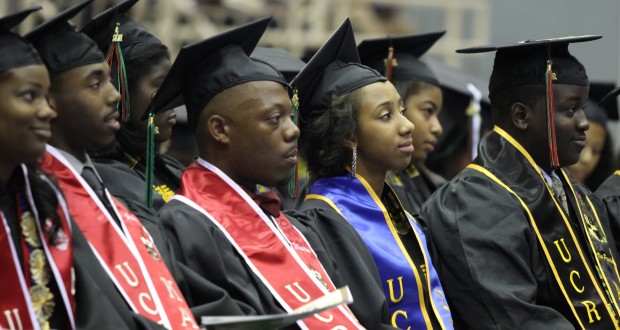RIVERSIDE, CA- For 45 years, African Student Programs (ASP) and Chicano Student Programs (CSP) at the University of California, Riverside campus has been providing a home away from home for students.
“‘Our duty in life is to make a difference in others’ lives,’ that was something a mentor once told me,” said Ken Simons, the director of African Student Programs. “That inspired me to do what I do. It’s rewarding to help these students, it’s rewarding to make a difference in their lives, it’s rewarding to provide a space for these students who might otherwise feel alone on a university campus.”
Simons has been the director of ASP for the past 14 years, and he’s been connected to UCR since 1979, when he was a student athlete. He said that, for many of the first-generation black students, ASP becomes the place where they feel comfortable expressing questions and concerns – especially cultural concerns.
“I’m real with the students, I tell them what they need to hear, because I realize they might not hear it from someone else,” Simons said.
Formerly referred to as Black Student Programs, ASP is generally agreed to have formed at UCR campus in 1972, out of the campus’ Black Student Union and Black Studies Department. Over the years, ASP has become a space where students can go to gain confidence, for support, and to feel at home.
“Years after graduating, we have students reflect on the mentorship they received during their time at UCR through ASP,” Simons said. “There are countless stories from students who recall getting through the tough times because of the conversations they had with staff at the organization.”
Since 1972, ASP has been a key component for the success of black students at UCR. Earlier this year, UCR was recognized as one of the nation’s best institutions in successfully graduating black students relative to their white counterparts. While black student graduation rates lag behind white student graduation rates by about 22 percent nationally, UCR graduates black students at a rate 1.7 percent higher than white students, announced The Education Trust, a Washington, D.C.-based non-profit organization that analyzed data from four-year colleges and universities in its report, “A Look at Black Student Success: Identifying Top- and Bottom-Performing Institutions.”
At UCR, 69.5 percent of black students graduate, compared with 41 percent nationally. Simons said that success can be linked to the variety of services ASP provides its students – like, informing them about scholarships, internships, research, and graduate school and career opportunities. ASP also sponsors a variety of events and programs every year, including an academic mentorship program, and the Black Graduation Ceremony – which is Sunday, June 11 at 2 p.m. at the Student Recreation Center.
Estella Acuna has been the director of CSP since 2004, and graduated from UCR in 1999. Acuna’s goal as the director is to give UCR students what CSP provided for her.
“I was a first-generation student, and CSP provided a home away from home for me. I felt safe, I felt connected to my peers and the community – I would have a hard time surviving without the amazing staff,” Acuna said.
Like ASP, CSP was founded in 1972. According to Acuna, the creation of the space stemmed from student and faculty movement aimed at developing an organization that would meet the needs of both Raza faculty and students on campus. They wanted a space that would nourish the growing Latino/a population of first-generation scholars coming to UCR.
“We are truly like a family at CSP. There is a sense of community, and unwavering support for the students,” Acuna said.
In 2015, UCR was recognized by the White House Initiative on Educational Excellence for Hispanics as a Bright Spot in Hispanic education. As a Bright Spot, UCR is part of a national online catalog that includes over 230 programs that invest in key education priorities for Hispanics. The university was honored for its student success efforts with the College of Natural and Agricultural Science’s freshman learning communities, as well as for its ethnic parity in campus graduation rates. It is rare in higher education to have little gap between students of different ethnicities.
CSP, like ASP, holds annual events, like Semana de la Raza, the César E. Chávez 5K Run/Walk, and Raza graduation ceremony, which will be Saturday, June 10.
For more information about both student programs, visit their websites: African Student Programs, and Chicano Student Programs.
 Westside Story Newspaper – Online The News of The Empire – Sharing the Quest for Excellence
Westside Story Newspaper – Online The News of The Empire – Sharing the Quest for Excellence



